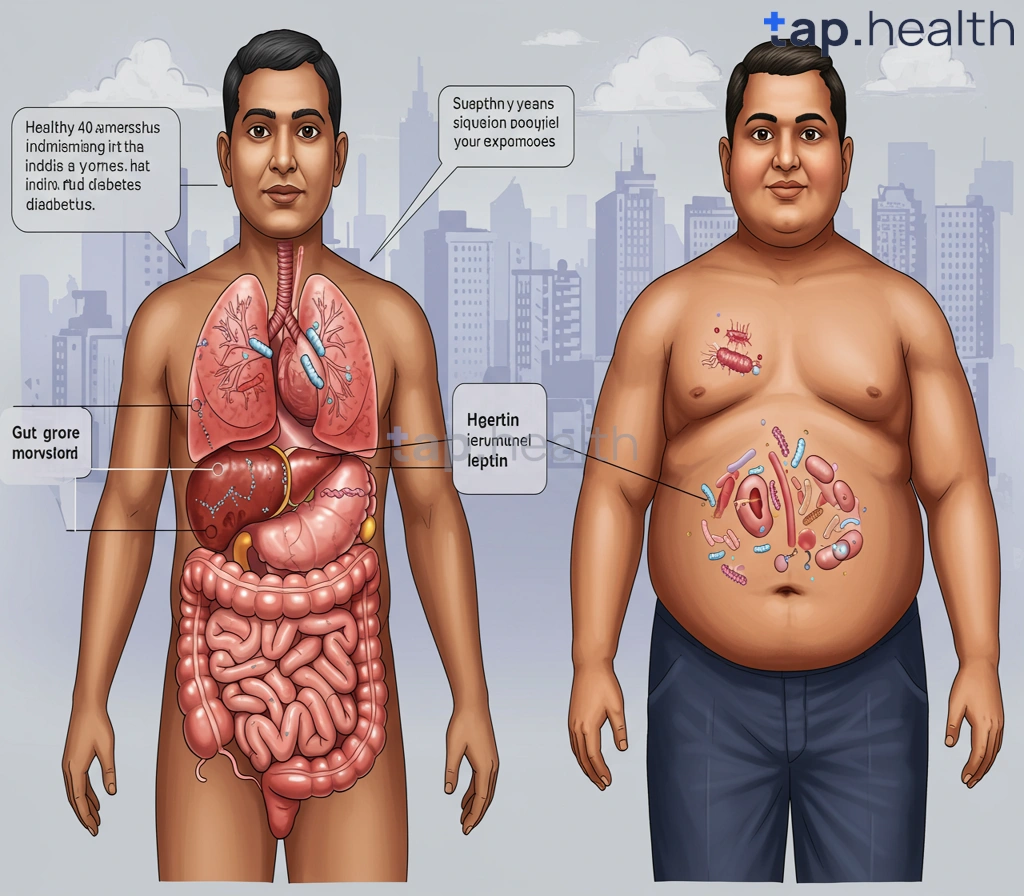Table of Contents
- Gut Hormone Imbalance: Obesity vs. Diabetes
- Understanding Gut Hormone Differences in Weight Management
- How Gut Hormones Vary Between Obese and Diabetic Individuals
- The Role of Gut Microbiota in Obesity and Diabetes
- Key Gut Hormone Differences: A Comparison Guide
- Frequently Asked Questions
- References
Ever wondered why some people seem to effortlessly maintain a healthy weight while others struggle, even with similar diets and activity levels? A significant piece of this puzzle lies in the intricate world of our gut hormones. This blog post delves into the fascinating differences in Gut Hormone Differences: Obesity vs. Healthy Individuals with Diabetes, exploring how imbalances in these chemical messengers can contribute to weight gain and the complexities of managing diabetes. We’ll uncover the latest research on how gut hormones influence appetite, metabolism, and overall health, providing valuable insights into these critical health challenges. Get ready to understand the crucial role your gut plays in your overall well-being!
Gut Hormone Imbalance: Obesity vs. Diabetes
Gut hormone imbalances play a significant role in both obesity and diabetes, particularly prevalent in the 20-64 age group, representing 61% of those with diabetes worldwide, according to the International Diabetes Federation. Understanding these differences is crucial for effective management and prevention, especially in Indian and tropical countries where these conditions are increasingly common.
Obesity and Gut Hormones
In obese individuals, there’s often an overproduction of ghrelin, the “hunger hormone,” leading to increased appetite and potentially contributing to weight gain. Simultaneously, the production of satiety hormones, like leptin (signaling fullness), may be impaired, further exacerbating the cycle of overeating. This imbalance can disrupt glucose metabolism, increasing the risk of developing type 2 diabetes. In tropical climates, factors like dietary habits and lifestyle choices can amplify these hormonal imbalances.
Diabetes and Gut Hormones
In individuals with diabetes, particularly type 2, the gut hormone picture is complex. While ghrelin levels might be similar to or slightly elevated in some, the real challenge lies in the impaired response to insulin. This insulin resistance impacts how effectively the body processes glucose, leading to elevated blood sugar. The gut microbiome, the community of bacteria in the intestines, also plays a crucial role, influencing the production and action of various gut hormones. Changes in the gut microbiome composition are linked to both obesity and diabetes. Learning more about What’s the Connection Between Gut Health and Your Diet? can provide valuable insights.
Regional Considerations for India and Tropical Countries
In India and other tropical nations, dietary patterns rich in refined carbohydrates and processed foods contribute to rising obesity and diabetes rates. These diets often disrupt the gut microbiome balance, further exacerbating hormonal imbalances. Promoting a healthy diet rich in fiber, fruits, and vegetables, alongside regular exercise, is essential for managing gut hormones and reducing the risk of both obesity and diabetes in these regions. For strategies to improve gut health and manage diabetes, consider exploring Enhance Gut Health and Manage Diabetes with Prebiotics and Probiotics. Consulting a healthcare professional for personalized advice tailored to your specific needs and lifestyle is highly recommended.
Understanding Gut Hormone Differences in Weight Management
Obesity and diabetes, prevalent health concerns globally, particularly in Indian and tropical countries, are significantly influenced by gut hormone imbalances. Research shows a higher prevalence of diabetes in males (8.9%) compared to females (7.8%), highlighting the need for gender-specific approaches in management strategies. These discrepancies underscore the complex interplay between gut microbiota, hormone production, and metabolic health.
Gut Hormone Imbalances in Obesity
Individuals with obesity often exhibit elevated levels of ghrelin, the “hunger hormone,” stimulating appetite and potentially leading to increased caloric intake. Conversely, levels of GLP-1 and PYY, hormones that suppress appetite and promote satiety, may be reduced, contributing to uncontrolled eating and weight gain. This imbalance disrupts the body’s natural regulation of energy balance, making weight loss challenging.
Gut Hormone Imbalances in Diabetes
In individuals with diabetes, particularly type 2 diabetes, the gut hormone profile is also significantly altered. Insulin resistance, a hallmark of type 2 diabetes, further complicates the interplay of gut hormones, influencing glucose metabolism and potentially exacerbating weight management difficulties. Improved gut health, through dietary interventions, may help regulate these hormones. Understanding how to regulate hormones with nutrition is crucial, especially for conditions like PCOS, as highlighted in our related article.
Actionable Steps for Improved Gut Health in India and Tropical Countries
For individuals in India and tropical countries, incorporating traditional, fiber-rich diets emphasizing whole grains, legumes, and fruits, can significantly impact gut hormone regulation. Prioritizing fermented foods like yogurt and kimchi, rich in probiotics, further supports a balanced gut microbiome. Consulting a healthcare professional or registered dietitian for personalized guidance tailored to your specific needs and regional dietary habits is crucial. This holistic approach, combining dietary changes with lifestyle modifications, can lead to improved gut health and better weight management. Remember that gut health isn’t just about physical health; it significantly impacts mental wellbeing as well.
How Gut Hormones Vary Between Obese and Diabetic Individuals
The gut microbiome and its associated hormones play a crucial role in metabolic health, particularly in the context of obesity and diabetes. Understanding these variations is critical, especially in regions like India and other tropical countries where diabetes prevalence is significantly high. According to the International Diabetes Federation’s Diabetes Atlas, urban areas in these regions experience a higher prevalence of diabetes (12.1%) compared to rural areas (8.3%). This disparity highlights the need to examine the interplay between gut hormones, lifestyle, and environment.
Impact of Obesity on Gut Hormones
Obesity often disrupts the delicate balance of gut hormones. Increased levels of ghrelin, the “hunger hormone,” and reduced levels of leptin, the “satiety hormone,” contribute to increased appetite and energy storage. This hormonal imbalance, coupled with alterations in gut microbiota composition, further exacerbates weight gain and insulin resistance. In obese individuals, the production of incretins, hormones that stimulate insulin release, may also be impaired, worsening glucose control. This connection between obesity and hormonal imbalances is further explored in our article, Understanding the Link Between Diabetes and Obesity.
Gut Hormones in Individuals with Diabetes
Individuals with diabetes, regardless of obesity status, exhibit distinct gut hormone profiles. For instance, they may show reduced levels of GLP-1 and GIP, incretins crucial for regulating blood sugar. This hormonal deficiency contributes to impaired glucose homeostasis and increased risk of complications. Further research is needed to understand the intricate interaction between gut microbiota, specific gut hormone levels, and the development and management of diabetes in diverse populations, especially within the context of varying environmental factors in Indian and tropical countries. Stress, for example, can significantly impact these hormonal levels, as detailed in our blog post, How Stress Hormones Affect Diabetes.
Actionable Steps for Improved Gut Health
Maintaining a healthy weight through balanced nutrition and regular physical activity is crucial. Prioritizing fiber-rich foods, such as fruits, vegetables, and whole grains, is essential for promoting a diverse and healthy gut microbiome. Consulting a healthcare professional for personalized advice on diet and lifestyle modifications tailored to your individual needs and regional context is highly recommended. This is particularly important given the higher prevalence of diabetes in urban areas of India and tropical countries.
The Role of Gut Microbiota in Obesity and Diabetes
The global economic burden of diabetes is staggering, costing a $760 billion annually. Understanding its complex interplay with obesity requires exploring the crucial role of the gut microbiota. This diverse community of microorganisms residing in our intestines significantly influences metabolism, impacting both weight management and blood sugar control.
Gut Hormone Imbalances in Obesity
In obese individuals, the gut microbiota composition often shifts, leading to an imbalance in the production of gut hormones like ghrelin (stimulates appetite) and leptin (suppresses appetite). This hormonal dysregulation contributes to increased food intake and reduced energy expenditure, further exacerbating obesity. Studies have shown a correlation between specific bacterial species and increased levels of ghrelin, potentially explaining the persistent hunger experienced by many obese individuals. In contrast, healthy individuals tend to maintain a more balanced gut microbiome and hormonal profile.
Gut Microbiota and Diabetes Management in India and Tropical Countries
The prevalence of type 2 diabetes is particularly high in India and other tropical countries, often linked to dietary habits and lifestyle factors. The gut microbiota plays a pivotal role in glucose metabolism and insulin sensitivity. Dysbiosis, or an imbalance in the gut microbiome, can impair these processes, increasing the risk of developing type 2 diabetes. Research into regionally specific dietary interventions and probiotic therapies targeting the gut microbiome offers promising avenues for improved diabetes management in these populations. For example, the inclusion of traditional fermented foods, abundant in beneficial bacteria, could potentially help restore gut microbial balance and improve metabolic health. Understanding the impact of nutrition is key, as detailed in How Nutrition Impacts Gut Health and the Microbiome.
Actionable Steps for Better Gut Health
Focusing on a balanced diet rich in fiber, prebiotics, and probiotics, alongside regular physical activity, is crucial for maintaining a healthy gut microbiome. In India and tropical regions, incorporating readily available local fruits, vegetables, and fermented foods like curd and idli into your diet can significantly contribute to a healthier gut and better management of obesity and diabetes. Consulting a healthcare professional or registered dietitian for personalized advice is highly recommended. It’s also important to be aware of the connection between diabetes and other health issues, such as The Link Between Diabetes and Fatty Liver.
Key Gut Hormone Differences: A Comparison Guide
Understanding the gut microbiome’s role in metabolic health is crucial, especially in regions like India and other tropical countries where diabetes and obesity are increasingly prevalent. Significant differences exist in gut hormone levels between obese individuals and those with healthy weight managing diabetes. For instance, individuals with obesity often exhibit elevated levels of ghrelin, the “hunger hormone,” leading to increased appetite and potentially contributing to weight gain. Conversely, they may show reduced levels of peptide YY (PYY), a satiety hormone that signals fullness, further exacerbating the problem. This imbalance can significantly impact blood glucose control, a critical factor in diabetes management.
Impact on Blood Sugar Control
The interplay of gut hormones is vital in regulating blood sugar. Individuals with diabetes, even those maintaining a healthy weight, may experience fluctuations in incretin hormones like GLP-1 and GIP, which stimulate insulin release after meals. These fluctuations can lead to inconsistent blood glucose levels. Obese individuals with diabetes often demonstrate a more pronounced dysregulation of these hormones, further complicating blood sugar management. Remember, HbA1c levels are a key indicator: below 5.7% is considered normal; 5.7%–6.4% indicates prediabetes, and 6.5% or higher suggests diabetes. This highlights the need for careful monitoring and management. For more information on maintaining Thyroid-Supporting Meals for Hormonal Balance, it is important to consider a balanced approach.
Regional Considerations in India and Tropical Countries
Dietary habits and lifestyle factors prevalent in India and tropical countries often contribute to the development of obesity and diabetes. High carbohydrate diets, coupled with reduced physical activity, can disrupt the gut microbiome and hormonal balance, increasing the risk of these conditions. Prioritizing a balanced diet rich in fiber, regular exercise, and stress management are crucial for maintaining healthy gut hormone levels and preventing or managing diabetes effectively. Learning about Hormonal Balance Recipes for a Healthier You can be a great starting point for dietary changes.
Actionable Steps for Better Gut Health
Consult a healthcare professional to assess your individual risk factors and develop a personalized plan. Regular monitoring of HbA1c levels is essential for effective diabetes management. Consider incorporating dietary changes, such as increasing your intake of fiber-rich foods, and incorporating regular physical activity into your daily routine. These small changes can significantly improve your gut health and overall well-being.
Frequently Asked Questions on Gut Hormone Differences: Obesity vs. Diabetes
Q1. What is the link between gut hormones and obesity/type 2 diabetes?
Imbalances in gut hormones, like increased ghrelin (hunger hormone) and decreased leptin (satiety hormone), contribute significantly to obesity. In type 2 diabetes, insulin resistance further disrupts this hormonal interplay, affecting glucose metabolism. These imbalances are often worsened by diets high in refined carbohydrates.
Q2. How does gut microbiome composition affect obesity and diabetes?
Changes in the gut microbiome are linked to both obesity and type 2 diabetes. A healthy gut microbiome plays a crucial role in regulating metabolism and glucose processing.
Q3. What are some ways to improve gut health and potentially manage obesity and diabetes?
Improving gut health is key to managing these conditions. Focus on a diet rich in fiber, incorporate regular exercise, and consider probiotics. Always consult a healthcare professional for personalized advice.
Q4. Who is most at risk for obesity and type 2 diabetes due to gut hormone imbalances?
Individuals aged 20-64, particularly in India and tropical countries, are at higher risk. This age group often experiences the most significant gut hormone imbalances.
Q5. Should I consult a doctor before making changes to my diet or lifestyle to improve gut health?
Yes, it’s crucial to consult a healthcare professional before making significant dietary or lifestyle changes, especially if you have pre-existing health conditions like obesity or diabetes. They can provide personalized guidance and monitor your progress.
References
- Diabetes Mellitus: Understanding the Disease, Its Diagnosis, and Management Strategies in Present Scenario: https://www.ajol.info/index.php/ajbr/article/view/283152/266731
- A Practical Guide to Integrated Type 2 Diabetes Care: https://www.hse.ie/eng/services/list/2/primarycare/east-coast-diabetes-service/management-of-type-2-diabetes/diabetes-and-pregnancy/icgp-guide-to-integrated-type-2.pdf




